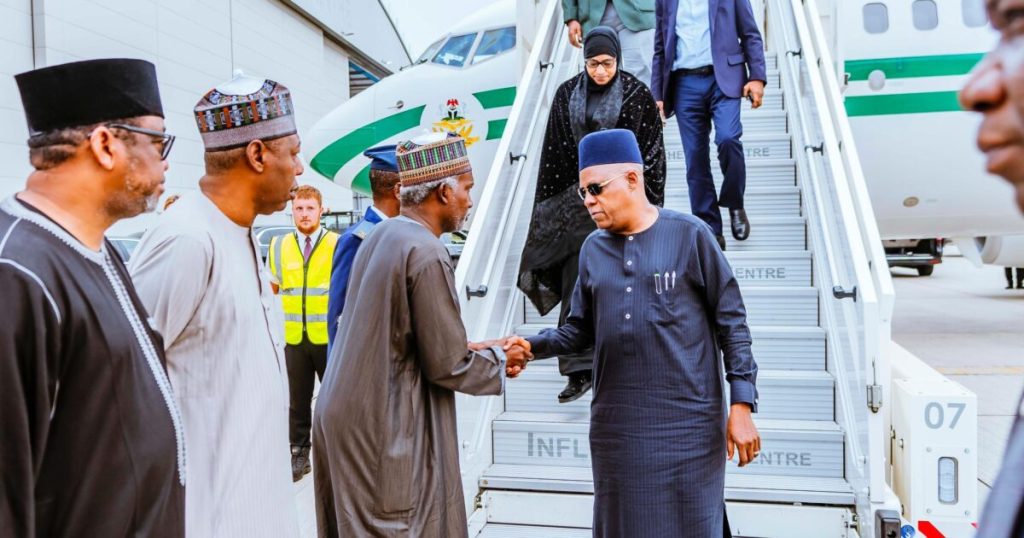Paragraph 1: The Passing of a Leader and a Nation’s Mourning
Nigeria, Africa’s most populous nation, mourned the passing of former President Muhammadu Buhari, who died in London on Sunday afternoon at the age of 82. Buhari, a towering figure in Nigerian politics, served two terms as the democratically elected president from 2015 to 2023, leaving an indelible mark on the nation’s history. His death prompted an outpouring of grief and tributes from across the country and beyond, as Nigerians reflected on his legacy and the impact he had on their lives. President Bola Tinubu, Buhari’s successor, expressed his deep condolences and ordered flags to be flown at half-staff throughout the country as a mark of respect for the departed leader.
Paragraph 2: A Dignified Return: Shettima Leads Delegation to London
In a gesture of honor and respect, President Tinubu directed Vice President Kashim Shettima and Chief of Staff Femi Gbajabiamila to travel to London to accompany Buhari’s remains back to Nigeria. Shettima arrived in London on Monday morning, accompanied by Gbajabiamila, where they were received by Foreign Affairs Minister Yusuf Tuggar and Borno State Governor Babagana Zulum. The presence of these high-ranking officials underscored the significance of the occasion and the deep reverence with which Buhari was held.
Paragraph 3: Buhari’s Life and Legacy: A Journey of Service and Resilience
Buhari’s life was one of dedication to public service, marked by both military and civilian roles. He first came to prominence as a military leader, serving as head of state from January 1984 to August 1985. Decades later, he transitioned to civilian politics and was elected president in 2015, ushering in a new era of democratic governance. His presidency focused on key issues such as tackling corruption, improving security, and diversifying the economy.
Paragraph 4: Final Farewell: Buhari to be Laid to Rest in Daura
Buhari’s remains were scheduled to be returned to Nigeria and laid to rest in his hometown of Daura, Katsina State, on Monday. The funeral arrangements reflected the Islamic faith that Buhari practiced devoutly throughout his life. The burial ceremony was expected to be attended by family members, dignitaries, and representatives from various communities, offering a final opportunity for the nation to pay their respects to a leader who had played such a pivotal role in its history.
Paragraph 5: Media Coverage and Official Communication
The news of Buhari’s death and the subsequent arrangements for his return and burial were widely reported by media outlets both within Nigeria and internationally. The information surrounding Vice President Shettima’s arrival in London was disseminated through an official statement released by his Senior Special Assistant on Media and Communication, Stanley Nkwocha. This ensured that the public was kept informed about the developments as they unfolded.
Paragraph 6: Remembering a Leader: Reflections on Buhari’s Impact
As Nigeria mourned the loss of its former president, the nation engaged in a period of reflection on his legacy and the impact he had on the country. While opinions on his policies and leadership style varied, Buhari’s commitment to public service and his unwavering dedication to Nigeria remained undeniable. His passing marked the end of an era, and the nation looked ahead to the future, carrying with it the lessons learned from his leadership.


